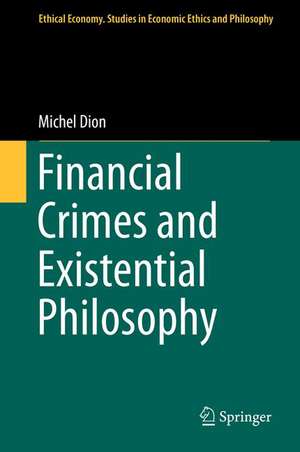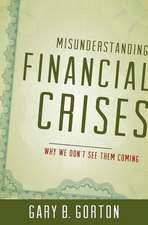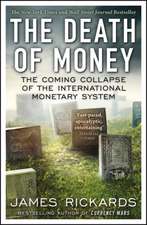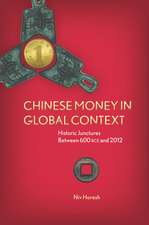Financial Crimes and Existential Philosophy: Ethical Economy
Autor Michel Dionen Limba Engleză Hardback – 5 noi 2013
| Toate formatele și edițiile | Preț | Express |
|---|---|---|
| Paperback (1) | 384.31 lei 6-8 săpt. | |
| SPRINGER NETHERLANDS – 23 aug 2016 | 384.31 lei 6-8 săpt. | |
| Hardback (1) | 391.61 lei 6-8 săpt. | |
| SPRINGER NETHERLANDS – 5 noi 2013 | 391.61 lei 6-8 săpt. |
Din seria Ethical Economy
- 18%
 Preț: 788.72 lei
Preț: 788.72 lei -
 Preț: 280.54 lei
Preț: 280.54 lei - 18%
 Preț: 1007.35 lei
Preț: 1007.35 lei - 18%
 Preț: 892.90 lei
Preț: 892.90 lei - 18%
 Preț: 782.42 lei
Preț: 782.42 lei -
 Preț: 497.00 lei
Preț: 497.00 lei - 15%
 Preț: 644.95 lei
Preț: 644.95 lei -
 Preț: 387.38 lei
Preț: 387.38 lei -
 Preț: 486.42 lei
Preț: 486.42 lei - 18%
 Preț: 948.79 lei
Preț: 948.79 lei - 18%
 Preț: 958.38 lei
Preț: 958.38 lei - 15%
 Preț: 634.18 lei
Preț: 634.18 lei - 15%
 Preț: 639.59 lei
Preț: 639.59 lei - 18%
 Preț: 942.94 lei
Preț: 942.94 lei - 15%
 Preț: 635.31 lei
Preț: 635.31 lei - 18%
 Preț: 949.42 lei
Preț: 949.42 lei - 15%
 Preț: 635.15 lei
Preț: 635.15 lei - 15%
 Preț: 635.47 lei
Preț: 635.47 lei - 18%
 Preț: 893.84 lei
Preț: 893.84 lei - 18%
 Preț: 948.92 lei
Preț: 948.92 lei - 18%
 Preț: 948.61 lei
Preț: 948.61 lei - 18%
 Preț: 1232.09 lei
Preț: 1232.09 lei - 18%
 Preț: 951.91 lei
Preț: 951.91 lei - 18%
 Preț: 1226.11 lei
Preț: 1226.11 lei - 18%
 Preț: 936.93 lei
Preț: 936.93 lei - 15%
 Preț: 641.53 lei
Preț: 641.53 lei - 18%
 Preț: 953.35 lei
Preț: 953.35 lei - 15%
 Preț: 635.96 lei
Preț: 635.96 lei - 18%
 Preț: 958.38 lei
Preț: 958.38 lei - 15%
 Preț: 632.55 lei
Preț: 632.55 lei - 15%
 Preț: 641.20 lei
Preț: 641.20 lei - 15%
 Preț: 633.53 lei
Preț: 633.53 lei - 15%
 Preț: 646.30 lei
Preț: 646.30 lei - 18%
 Preț: 949.23 lei
Preț: 949.23 lei -
 Preț: 487.57 lei
Preț: 487.57 lei - 15%
 Preț: 639.59 lei
Preț: 639.59 lei - 15%
 Preț: 636.45 lei
Preț: 636.45 lei - 18%
 Preț: 942.01 lei
Preț: 942.01 lei - 18%
 Preț: 964.23 lei
Preț: 964.23 lei - 18%
 Preț: 1221.69 lei
Preț: 1221.69 lei
Preț: 391.61 lei
Nou
Puncte Express: 587
Preț estimativ în valută:
74.94€ • 77.95$ • 61.87£
74.94€ • 77.95$ • 61.87£
Carte tipărită la comandă
Livrare economică 14-28 aprilie
Preluare comenzi: 021 569.72.76
Specificații
ISBN-13: 9789400773257
ISBN-10: 9400773250
Pagini: 295
Ilustrații: XXI, 204 p.
Dimensiuni: 155 x 235 x 22 mm
Greutate: 0.5 kg
Ediția:2014
Editura: SPRINGER NETHERLANDS
Colecția Springer
Seria Ethical Economy
Locul publicării:Dordrecht, Netherlands
ISBN-10: 9400773250
Pagini: 295
Ilustrații: XXI, 204 p.
Dimensiuni: 155 x 235 x 22 mm
Greutate: 0.5 kg
Ediția:2014
Editura: SPRINGER NETHERLANDS
Colecția Springer
Seria Ethical Economy
Locul publicării:Dordrecht, Netherlands
Public țintă
ResearchCuprins
Introduction.- Chapter 1- Existential/Existentiell Philosophy.- 1.1 The Precursors of Existential/Existentiell Philosophy (Kierkegaard, Nietzsche).- 1.2 Existentiell-Ontical Philosophy (Jaspers, Buber, Marcel).- 1.3 Existentialism (Sartre).- 1.4 Existential-Ontological Philosophy (Heidegger).- Chapter 2- Nietzsche and Informal Value Transfer Systems (IVTS).- The Will to Truth.- The Nietzschean Will to Power : The Way Beyond Morality.- The Nietzschean Way Beyond Nihilism.- Informal Value Tranfer Systems (IVTS) and Nietzsche’s interpretation of interpretation.- Chapter 3- Kierkegaard and the Aesthetic/Ethical Life-View : The Issue of Money Laundering.- 3.1 Kierkegaard’s Notions of Aesthetic and Ethical Life.- 3.2Moral Reasoning and the Phenomenon of Money Laundering.- Chapter 4- Jaspers and Buber about Communication : The Issue of Bribery.- Jaspers’ View on Truth and Communication.- Buber’s View on Dialogue.- Bribery as Distorted Communication.- Chapter 5- A Heideggerian and Marcellian View on Technology : The Philosophical Challenge of Cybercrime.- Heidegger’s View on the Essence of Technology.- Marcel’s View on Technology.- Cybercrime and the Relevance of Heidegger’s and Marcel’s Philosophy.- Chapter 6- Tillichian Courage to Be, or How to Fight Fraudulent Practices : Tillich and Existentialism.- The Courage to Resist Non-Being.- The Interdependence between the Courage to Be Oneself and the Courage to Be a Part of Conmmunity.- The Courage of Despair and the Courage to Accept God’s Acceptance.- The Courage to Be and Fraudulent Practices.- Chapter 7- Organizational Life as Narrative : A Sartrean View on Prevention Strategies Against Financial Crimes.- Organizational Life as Narrative.- Fighting Financial Crimes and Pursuing the Main Objectives of Communicational Exchanges Within Organizational Life.- The Other as Partner of Communicational Exchange Within Organizational Life.- Conclusion.- Bibliography.
Textul de pe ultima copertă
The aim of this book is to deepen our understanding of financial crimes as phenomena. It uses concepts of existential philosophies that are relevant to dissecting the phenomenon of financial crimes. With the help of these concepts, the book makes clear what the impact of financial crimes is on the way a human being defines himself or the way he focuses on a given notion of humankind. The book unveils how the growth of financial crimes has contributed to the increase of the anthropological gap, and how the phenomenon of financial crimes now distorts the way we understand humankind. Using the existential philosophies of Kierkegaard, Nietzsche, Jaspers, Buber, Heidegger, Marcel, Tillich, and Sartre, the book sheds light on how these philosophies can help to better perceive and describe financial crimes. The book provides readers with existential principles that will help them be more efficient when they have to design and implement prevention strategies against corporate crime.
Caracteristici
First volume to focus on financial crimes from a philosophical viewpoint Emphasises the importance of the "existential philosophies" of Kierkegaard, Nietzsche, Jaspers, Marcel, Buber, Tillich, Heidegger and Sartre Addresses the phenomenon of "given financial crimes" (money laundering, bribery, cybercrime) Provides philosophically-based principles for efficient prevention strategies against financial crimes?













